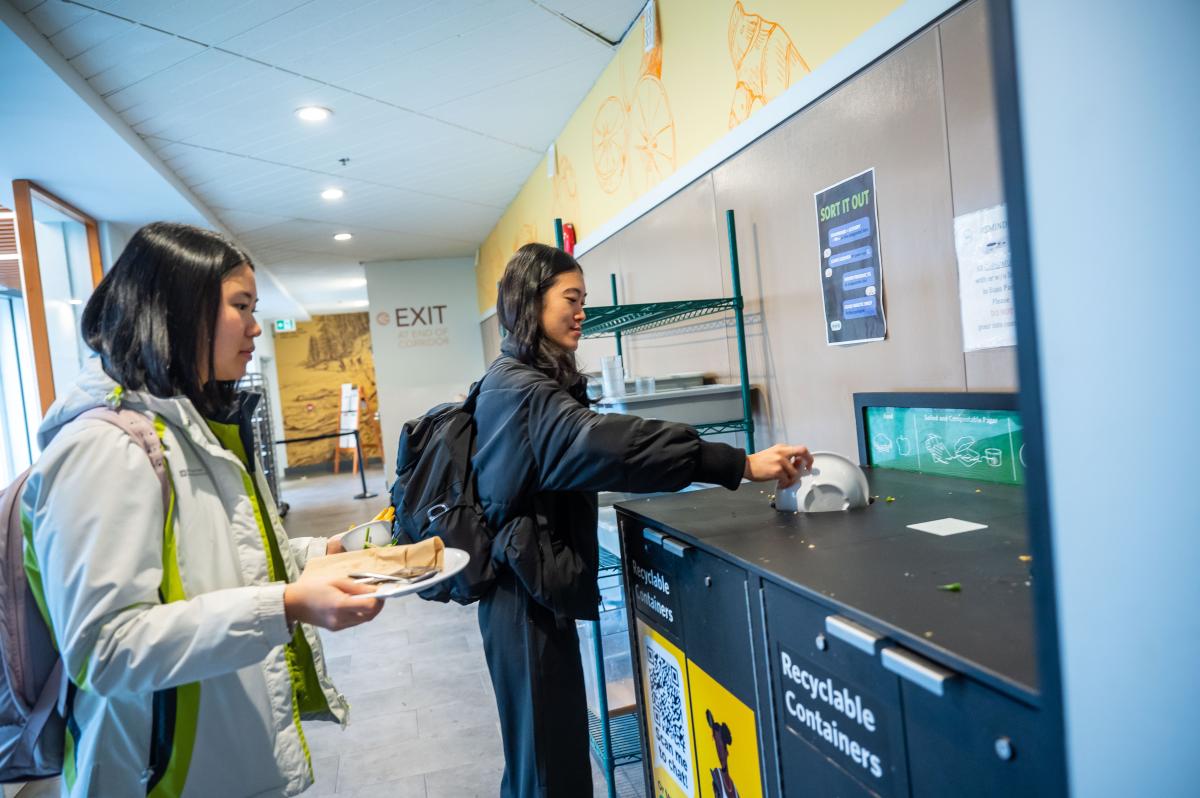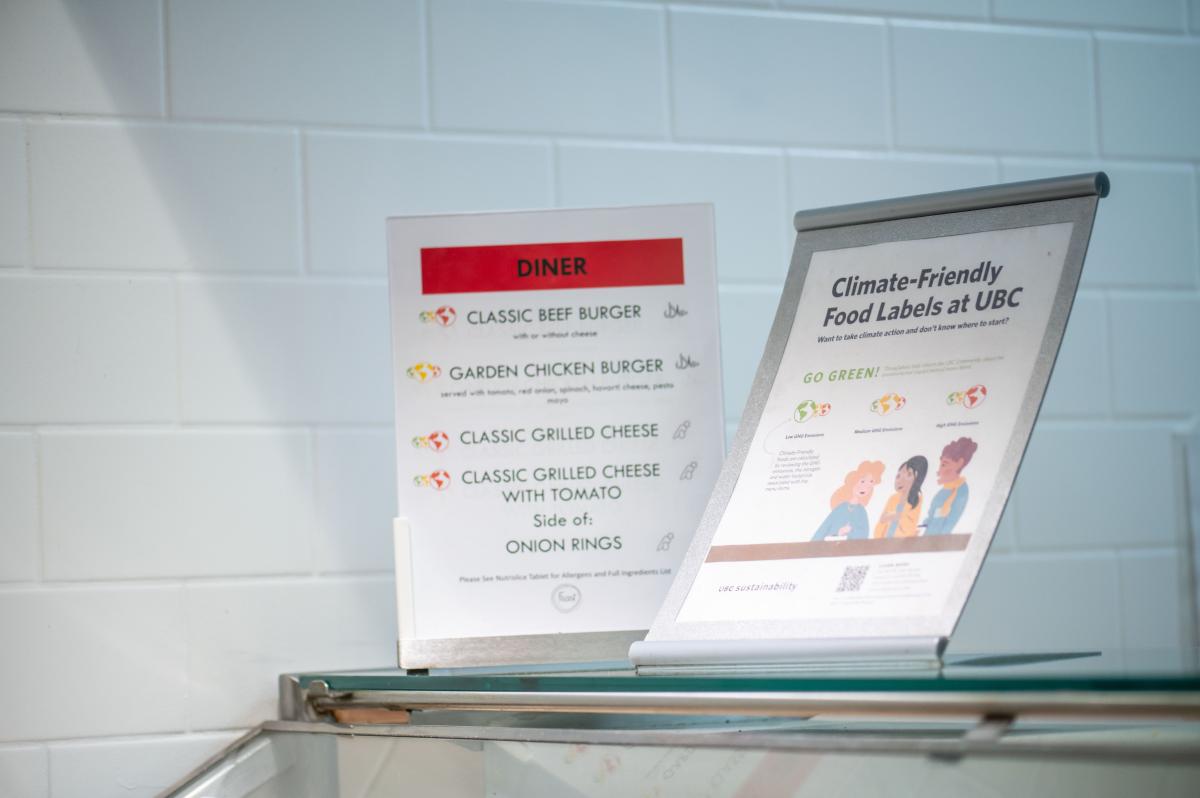The UBC Food System Project (UBCFSP) is a multi-stakeholder and interdisciplinary initiative for connecting campus food system stakeholders spanning staff, faculty and students, in applied research and collaborations to advance a just and sustainable campus food system. Working together we inspire collaborative action in all that we do to catalyze global change.

Engineering students measured food plate waste at one of UBC’s Dining Halls (Open Kitchen). This research aimed to create a baseline for post-consumer food waste after the adoption of the All Access dining model. The student group calculated associated GHG emissions from the wasted food, made recommendations for future waste audits, and suggested strategies to reduce post-consumer food waste.

In student-led projects, Silvia Huang and Jenny Lee implemented a semi-automated recipe environmental impact evaluation for UBC Food Services residence dining halls. Their work estimates GHG emissions, stress-weighted water use, and embedded nitrogen for all food prepped and served at the dining halls. These calculations feed into the Climate-Friendly Food System Labels being piloted at the dining halls.

Land and Food System students researched opportunities and barriers to promoting student food security and reducing food waste by enhancing food surplus and recovery collaborations in the AMS Nest. The student group found some key short and medium term actions to improve collaboration between the AMS Food outlets and the AMS Food Bank.
By participating in UBCFSP collaboration, you can:
- Join a well-established interdisciplinary campus network and contribute to applied student research and collaborations that can generate scalable solutions to advance a just and sustainable food system
- Strengthen your knowledge about food system sustainability challenges and solutions from diverse disciplines and perspectives
- Help inform and advance UBC’s food system sustainability affiliated plans, policies and practices
-
Grow your network and make connections with campus operational practitioners, faculty, students and community partners
about
Initiated by the Faculty of Land & Food Systems and the SEEDS Sustainability Program in 2001, the UBC Food System Project (UBCFSP) is comprised of representatives from various facets of UBC’s food system and applies a radially organized and community-based action research approach to collaboratively identify and implement transitions towards food system sustainability.
Since 2001, the initiative has engaged over 2,100 students, campus food system staff representatives and faculty members in 265 projects across 30 courses.
WHO WE ARE
The UBCFSP is led by a Steering Committee including representation from 22 campus community and academic units, and provides advisory guidance towards our vision to advance a just and sustainable food system.
Together with their extended networks, the UBCFSP Steering Committee provides interdisciplinary expertise and guidance to help inform and advance the development and implementation of campus policies, plans and practices that address and respond to key food system sustainability and related issues. This is done through local research projects and partnerships that utilize the Campus as Living Laboratory.
Action Teams are made up of engaged experts from the UBCFSP Steering Committee and other partners who support the implementation of priorities. For example, the Climate-Friendly Food Systems (CFFS) Action Team informs student research and collaborations between staff, faculty and students that can accelerate transitions towards a climate-friendly food system and advance UBC’s Climate Action Plan 2030 Food Actions.
View our UBC Campus Food System Knowledge Networks Map to see a visualization of the UBCFSP Steering Committee, Action Teams and affiliated networks, and learn more about the people behind this work.
Applying a community based and systems approach, the UBCFSP has established the following vision, mission and goals:
VISION
UBC is committed to a just and sustainable food system, inspiring collaborative action in all that we do to catalyze global change.
MISSION
To serve as UBC’s collaborative, cross-campus initiative that brings together partners in academics, operations, and research to further advance campus food system sustainability ideas, policies and practices.
GOALS
1. To conduct a UBC food system sustainability assessment
2. To identify barriers that impinge on the ability of food system partners to make desired transitions towards sustainability
3. To create a shared vision and consensus-based guiding principles of a sustainable UBC food system
4. To develop a shared model, opportunities and actions collectively deemed necessary to facilitate transitions towards UBC food system sustainability
5. To offer students applied learning, research and professional development opportunities for positive impact on ecological and human health
6. To positively impact the movement towards the sustainability of the larger British Columbian, Canadian, and global food systems
Research focus areas
RESEARCH FOCUS AREA 1: CLIMATE-FRIENDLY FOOD LABEL & DATA ASSESSMENT
Goal:
Develop and pilot a scalable Climate-Friendly Food System (CFFS) label and operational framework, as a key first step towards advancing UBC's food system climate mitigation efforts.
Key Deliverables:
- Community-based “UBC Climate-Friendly Food System Definition”
- Methodology and Data Assessment Framework that assesses GHG emissions, nitrogen and water associated with campus menus
- Scalable Climate-Friendly Food System (CFFS) label launched to support informed purchasing choices
- Multi-year evaluation of the perceptions and the impacts that labels have on awareness, knowledge and purchasing decisions
- Climate-Friendly Food System Toolkit
RESEARCH FOCUS AREA 2: CLIMATE-FRIENDLY FOOD SYSTEM (CFFS) PROCUREMENT RESEARCH CLUSTER
Goal:
Co-develop and inform the implementation of campus-wide Climate-Friendly Food System Procurement Guidelines applicable to food providers.
Key Deliverables:
-
Climate-Friendly Food System Procurement Strategy
RESEARCH FOCUS AREA 3: CIRCULAR FOOD SYSTEMS RESEARCH CLUSTER
Goal:
Promote a circular economy food system on campus and beyond.
Key Deliverables:
- Food Waste Prevention, Reduction and Recovery Strategy
- Pre-consumer campus food waste baseline
-
Quantification of GHG emissions and costs associated with pre-consumer food waste
key accomplishments at a glance
STUDENT ENGAGEMENT
- Over 2400 UBC undergraduate and graduate students across 30+ courses and co-curricular activities engaged in applied research to advance food system sustainability
- Over 600 student research reports that have informed demonstrable change in out campus food system
POLICIES, PLANS AND PRACTICIES
UBCFSP student-led research and partnerships produce tangible outcomes, including informing the development and implementation of UBC's operational sustainability and wellbeing policies, plans, and practices:
UBC Operational Sustainability & Wellbeing Plans and Policies:
- Informed the development of a diversity of UBC's food system sustainability strategies, plans and policies, including: UBC Zero Waste UBC Foodware Guidelines, Climate Action Plan 2010 - Food Area, Climate Action Plan 2030 - Food Areas, UBC's Food Action Framework, Fair Trade Campus, and AMS' Lighter Footprint Strategy and its most recent update as the AMS Sustainability Action Plan.
- Current collaborations are informing the development of UBC's Climate Action Plan 2030 food goals, targets, and actions, and contributing to an update of UBC's Green Building Action Plan, and the Residential Environmental Assessment Program (REAP)
- The SEEDS Climate-Friendly Food System Action Team and supporting student-led research directly informed the University’s commitment to climate action in our food system, including the development of a target and 7 supporting actions in the UBC Climate Action Plan 2030: Food System Areas
- First set of food system targets embedded in a campus sustainability strategy - AMS Lighter Footprint Strategy
- Food Vision & Values: A multi-year partnership between UBC Food Services and Land and Food Systems 450 course annually baselines and provides recommendations to update Food Vision and Values to ensure continued leadership in campus food sustainability and wellbeing. Most recently research has informed UBCFS value of “Caring for and supporting our Planet” includes commitments to climate-friendly food systems, local food, zero waste and more.
UBC Operational Sustainability & Wellbeing Practices:
- The first formal agreement between campus food vendors and UBC Farm which resulted in local squash being added to students' pizzas and has since evolved to an expanded farm-to-institution partnership across both of the campus' main food providers
- The first partnership between between campus food providers and organic food distributors which saw the local organic apples being procured and then scaled out to other items
- The first student-owned, building-scale composting system in Canada, as part of the AMS Nest’s commitment to sustainability
- Behavioural and structural interventions that informed improvements in food waste sorting, reusable food ware items and programs, and biodegradable single-use items.
- The first “green-tax” on to-go containers at residence dining halls to reduce waste
- The first food waste measurement pre-consumer food waste baseline completed at the Open Kitchen
- The development of food recovery strategies with AMS and Food Services Sustainable food procurement, including the the first local organic fruit sold in campus residence dining halls to the expansion of other local food product procurement
- UBC community-based “Climate-Friendly Food System Definition” developed an audit of campus food ware, that led to the development UBC’s Zero Waste Food Ware Strategy
- The creation and development of the first campus food garden, and many others since then, and creation of a campus garden guidelines to help others start their own
INTERDISCIPLINARY PARTNERSHIPS
Committees & Action Teams
Formalized governance structure includes a UBC Food System Project Steering Committee and supporting Action Teams who provide interdisciplinary expertise and guidance on food system related planning and practices, feedback on strategic priorities and initiatives and input on initiative progression.
Climate-Friendly Food Systems Action Team
- The Climate-Friendly Food Systems Action Team (CFFS-AT) is a group of engaged experts from the UBCFSP Steering Committee and other partners who collaborate to inform applied student research and collaborations between staff, faculty and students that can accelerate transitions towards a climate-friendly food system and advance UBC’s Climate Action Plan 2030 Food Actions.
Circular Economy Research Action Team
- Forthcoming
KNOWLEDGE MOBILIZATION
Publications
- Over 600 student research reports published
Maps
- UBC Food System Asset Map
This map serves as a centralized platform that showcases food system and food security initiatives, resources, programming, research, and collaborations on the UBC Campus to advance a just and sustainable food system.
- Campus Food System Knowledge Networks Map
This map provides centralized information about UBC people (practitioners, researchers, instructors, students), networks and initiatives connected to UBC’s Food System. This tool is to help people connect with others, and enable greater collaboration across our campus, bridging campus operations and academia.
Events
- In 2019, SEEDS and UBC Wellbeing co-hosted the first Action Research Symposium on the topic of food insecurity, which brought together staff, faculty, and students to share interdisciplinary research on the current state of student food insecurity, and to work together to identify opportunities to lead in addressing the challenges. The success of this knowledge exchange pilot can be seen in its contribution to the launching of the Food Security Initiative (see below). SEEDS has long been involved in developing campus food-growing gardens, whether it’s establishing food gardens in neighbourhoods and the academic campus, or directly informing the now-adopted procedures for setting up a new food garden on campus. The result can be seen in over 15 food-growing gardens by residents, staff, students, and faculty that serve the community as sites of research, teaching, learning, food growing, and social connection.
Resources
- Sustainable Campus Food Guide (2013)
This was the first campus resource developed to raise awareness and facilitate participation in sustainable food system initiatives on campus, and is currently being updated.
READY TO CONNECT AND EXPLORE A UBCFSP COLLABORATION?
Please get in touch if you have questions or want to get involved in UBCFSP.
Liska Richer
Manager, SEEDS Sustainability Program | Campus + Community Planning